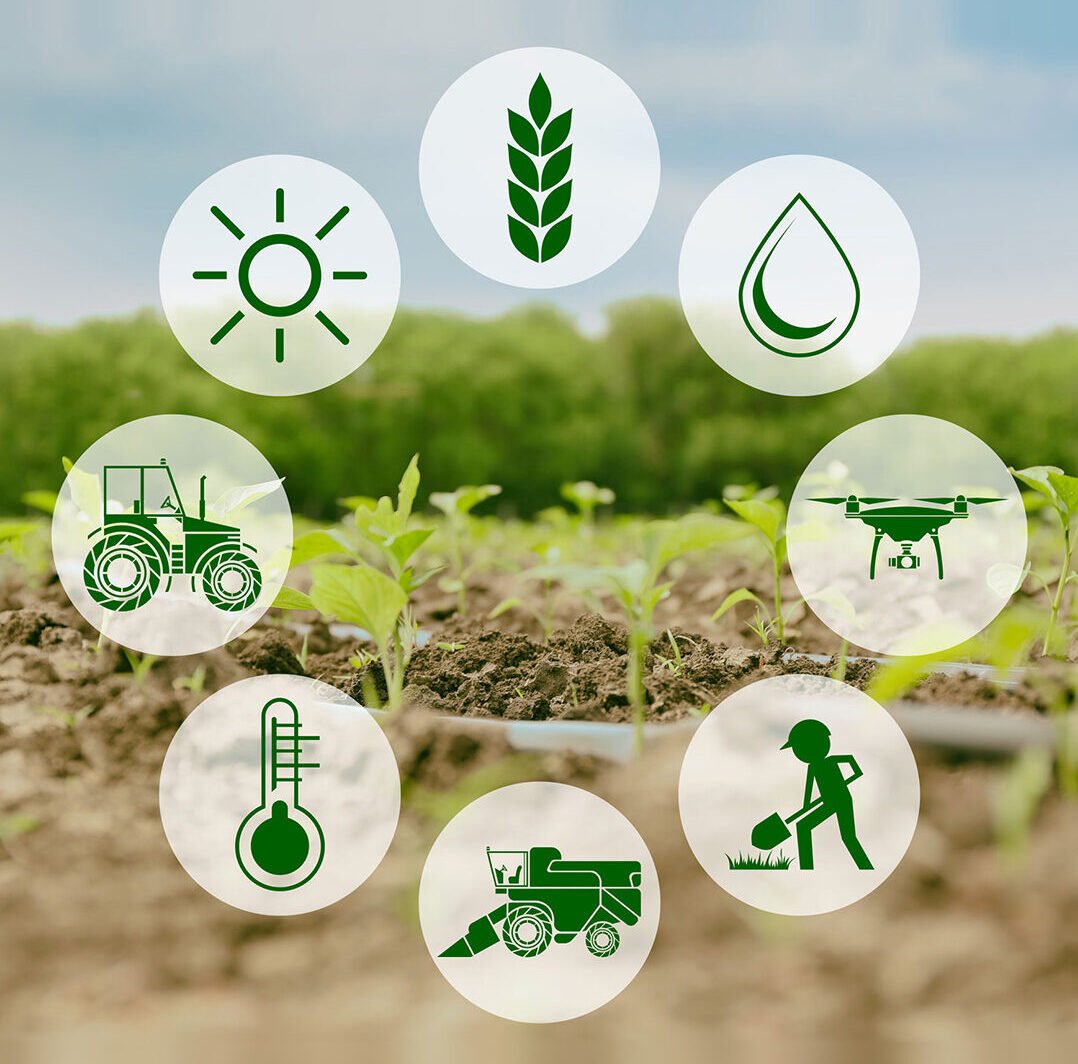Agriculture
AI-powered solutions are reshaping agriculture, providing farmers with real-time insights and precision to achieve higher yields and sustainable practices.
AI-powered solutions are reshaping agriculture, providing farmers with real-time insights and precision to achieve higher yields and sustainable practices. These innovative technologies leverage artificial intelligence to analyze vast amounts of data from sources like satellite imagery, drones, sensors, and weather forecasts. By processing this data, AI algorithms can provide farmers with actionable insights into crop health, soil conditions, pest infestations, and irrigation needs in real time.

Crop Management: Tools for planning, monitoring, and managing crop activities such as planting, fertilizing, irrigating, and harvesting.
Field Mapping: Capabilities to create digital maps of fields, including boundaries, soil types, and topography, to optimize resource allocation and planning.
Inventory Management: Modules for tracking and managing inventory, including seeds, fertilizers, pesticides, and equipment, to ensure timely availability and minimize waste.
Weather Forecasting: Integration with weather data services to provide real-time and forecasted weather information for informed decision-making.
Livestock Management: Features for tracking animal health, breeding, feeding, and production metrics, including weight gain and milk production.
Equipment Tracking and Maintenance: Tools to monitor equipment usage, schedule maintenance tasks, and track repair history to optimize equipment performance and minimize downtime.
Financial Management: Modules for budgeting, expense tracking, revenue forecasting, and financial reporting to monitor profitability and manage financial resources effectively.
Precision Agriculture Tools: Integration with precision agriculture technologies such as GPS, drones, and sensors to optimize input application, monitor crop health, and maximize yields.
Mobile Accessibility: Mobile applications or responsive design for accessing and managing farm data from smartphones and tablets, enabling on-the-go decision-making.
Data Analytics and Reporting: Analytics tools for generating insights from farm data, including yield analysis, cost-benefit analysis, and performance reporting, to support data-driven decision-making.
Compliance and Regulations: Features to ensure compliance with agricultural regulations, certifications, and environmental standards, including traceability and record-keeping requirements.
Collaboration and Communication: Tools for sharing data, tasks, and messages among team members, advisors, suppliers, and other stakeholders to facilitate collaboration and coordination.
Remote Monitoring and Control: Remote monitoring capabilities for accessing real-time data and controlling equipment, irrigation systems, and other farm operations from anywhere with an internet connection.
Integration with External Systems: APIs and integrations with other software systems such as accounting software, marketplaces, and supply chain management tools to streamline data flow and automate workflows.

AI Innovations Transform Farming
Precision agriculture is undergoing a transformative evolution with the advent of AI solutions. These cutting-edge technologies harness the power of artificial intelligence, machine learning, and data analytics to revolutionize how farmers manage their operations, optimize resources, and maximize yields. Here’s a glimpse into the advancements shaping the field:

Crop Monitoring and
Management
AI-powered systems analyze satellite imagery, drone footage, and sensor data to monitor crop health, identify areas of stress, and detect early signs of disease or pest infestation. By analyzing these insights, farmers can take targeted actions such as adjusting irrigation, applying fertilizers or pesticides only where needed, and implementing timely interventions to protect crop health and maximize yields

Predictive Analytics for Yield Forecasting
Using historical and real-time data on weather patterns, soil conditions, and crop growth stages, AI algorithms can forecast future yields with a high degree of accuracy. These predictive analytics enable farmers to anticipate market demand, optimize harvest timing, and make informed decisions about storage, transportation, and marketing strategies.

Precision Irrigation
Management
AI-powered irrigation systems monitor soil moisture levels, weather forecasts, and crop water requirements to optimize water usage and minimize waste. By precisely controlling irrigation schedules and applying water only where needed, farmers can conserve water resources, reduce energy costs, and prevent overwatering or underwatering of crops.

Weed and Pest Detection
AI algorithms trained on image recognition technology can accurately identify and differentiate between crops, weeds, and pests in real-time. This enables farmers to target herbicide or pesticide applications only to areas with weed or pest infestations, reducing chemical usage, minimizing environmental impact, and preserving crop health.

Autonomous Farming Equipment
AI-driven autonomous vehicles and machinery equipped with sensors and cameras can perform tasks such as planting, spraying, and harvesting with precision and efficiency. These autonomous systems can operate day and night, in all weather conditions, and navigate complex field terrains, reducing labor costs, improving productivity, and enabling round-the-clock farming operations.

Decision Support Systems
AI-powered decision support systems integrate data from multiple sources, such as weather forecasts, soil samples, crop performance records, and market trends, to provide farmers with personalized recommendations and actionable insights. These systems help farmers make informed decisions about crop selection, planting strategies, input management, and risk mitigation, optimizing profitability and sustainability.
